Unit2 How often do you exercise? Section A 1a-3b 知识点串讲课件(共15张PPT)
文档属性
| 名称 | Unit2 How often do you exercise? Section A 1a-3b 知识点串讲课件(共15张PPT) | 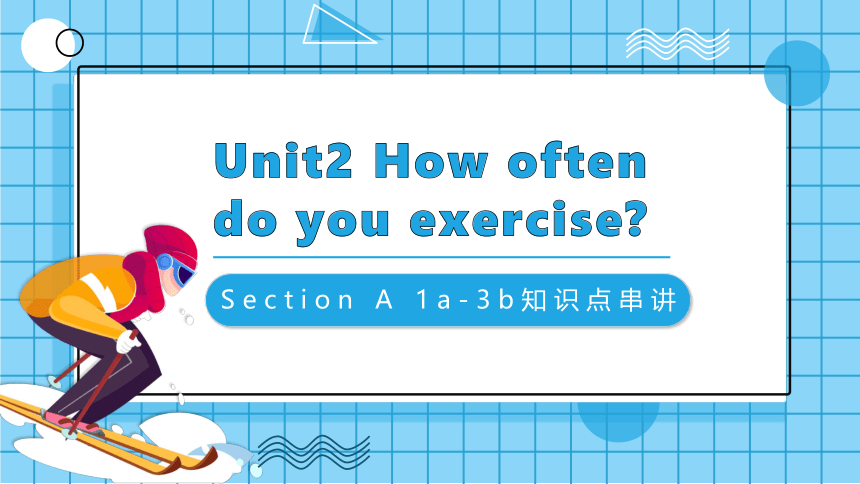 | |
| 格式 | zip | ||
| 文件大小 | 474.9KB | ||
| 资源类型 | 教案 | ||
| 版本资源 | 人教新目标(Go for it)版 | ||
| 科目 | 英语 | ||
| 更新时间 | 2022-10-10 15:26:32 | ||
图片预览



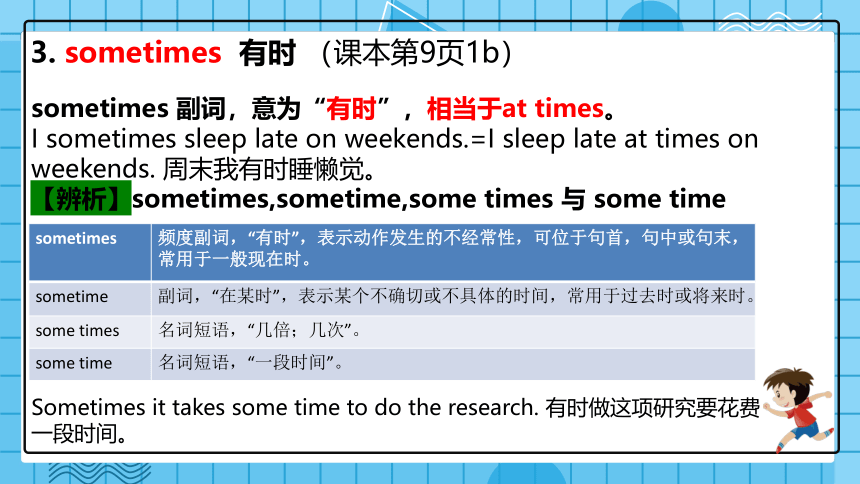
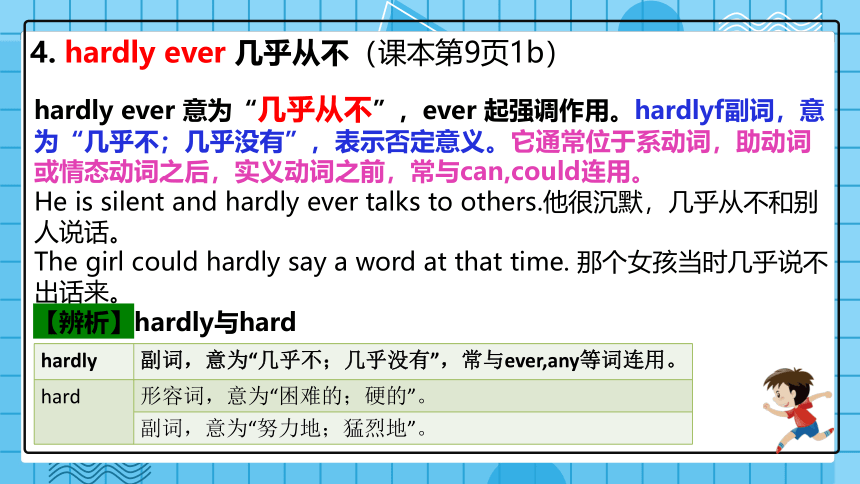
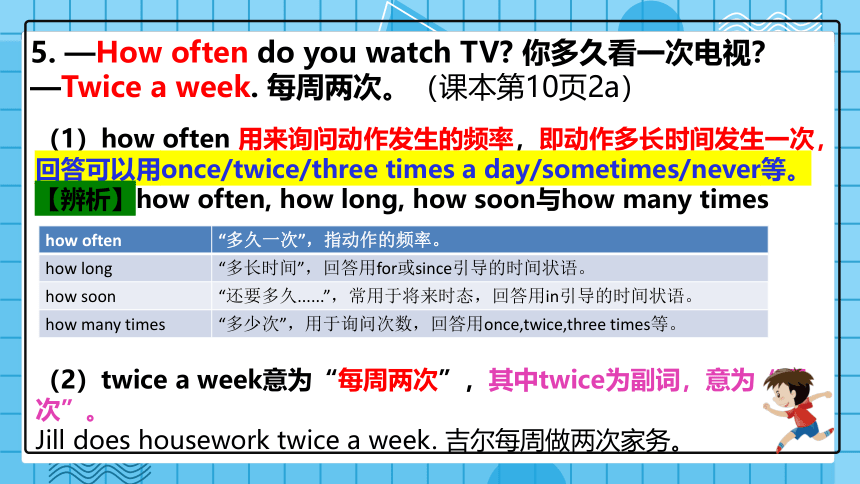
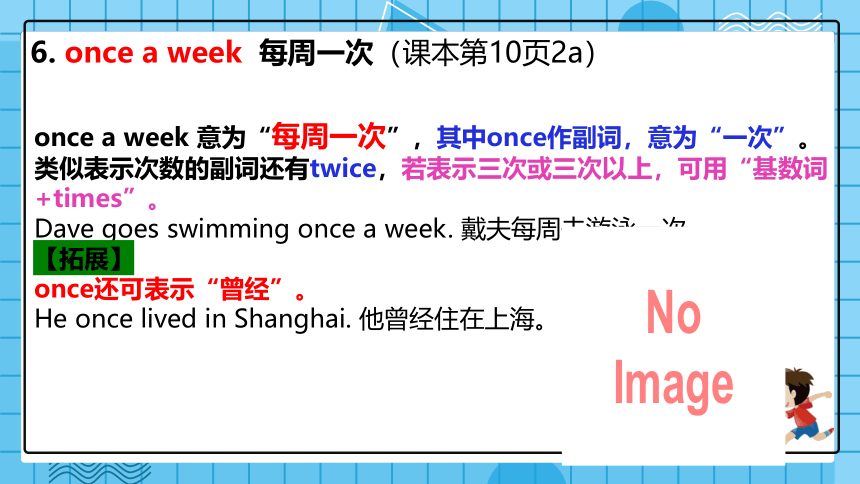
文档简介
(共15张PPT)
Section A 1a-3b知识点串讲
Unit2 How often do you exercise
1. What do you usually do on weekends 你周末通常做什么? (课本第9页图片)
on weekends 意为“每逢周末;在周末”。
而on the weekend则表示“在周末;在这个周末”,特指在某个周末。
You should have a rest on weekends.你应该在周末休息一下。
Jack will visit his uncle on the weekend. 杰克这个周末将去看望他的叔叔。
【拓展】
on weekdays 意为“在工作日”。
I‘m busy on weekdays.May I see you on weekends 我工作日很忙,可以每逢周末与你见面吗?
2. help with housework 帮着做家务(课本第9页1a)
(1)help (sb.)with sth. 意为“帮助(某人)做某事”,相当于help (sb. to)do sth.。
Can you help me with my English =Can you help me (to)learn English 你可以帮我学英语吗?
(2)housework不可数名词,意为“家务劳动;家务事”。常用搭配为:do (the)housework “做家务”。
We should help our parents do (the) housework. 我们应该帮助父母做家务。
【拓展】
homework不可数名词,意为“家庭作业”,其常用搭配为:
do one’s homework。 “做家庭作业”。
3. sometimes 有时 (课本第9页1b)
sometimes 副词,意为“有时”,相当于at times。
I sometimes sleep late on weekends.=I sleep late at times on weekends. 周末我有时睡懒觉。
【辨析】sometimes,sometime,some times 与 some time
Sometimes it takes some time to do the research. 有时做这项研究要花费
一段时间。
sometimes 频度副词,“有时”,表示动作发生的不经常性,可位于句首,句中或句末,常用于一般现在时。
sometime 副词,“在某时”,表示某个不确切或不具体的时间,常用于过去时或将来时。
some times 名词短语,“几倍;几次”。
some time 名词短语,“一段时间”。
4. hardly ever 几乎从不(课本第9页1b)
hardly ever 意为“几乎从不”,ever 起强调作用。hardlyf副词,意为“几乎不;几乎没有”,表示否定意义。它通常位于系动词,助动词或情态动词之后,实义动词之前,常与can,could连用。
He is silent and hardly ever talks to others.他很沉默,几乎从不和别人说话。
The girl could hardly say a word at that time. 那个女孩当时几乎说不出话来。
【辨析】hardly与hard
hardly 副词,意为“几乎不;几乎没有”,常与ever,any等词连用。
hard 形容词,意为“困难的;硬的”。
副词,意为“努力地;猛烈地”。
5. —How often do you watch TV 你多久看一次电视?
—Twice a week. 每周两次。(课本第10页2a)
(1)how often 用来询问动作发生的频率,即动作多长时间发生一次,回答可以用once/twice/three times a day/sometimes/never等。
【辨析】how often, how long, how soon与how many times
(2)twice a week意为“每周两次”,其中twice为副词,意为“两次”。
Jill does housework twice a week. 吉尔每周做两次家务。
how often “多久一次”,指动作的频率。
how long “多长时间”,回答用for或since引导的时间状语。
how soon “还要多久......”,常用于将来时态,回答用in引导的时间状语。
how many times “多少次”,用于询问次数,回答用once,twice,three times等。
6. once a week 每周一次(课本第10页2a)
once a week 意为“每周一次”,其中once作副词,意为“一次”。类似表示次数的副词还有twice,若表示三次或三次以上,可用“基数词+times”。
Dave goes swimming once a week. 戴夫每周去游泳一次。
【拓展】
once还可表示“曾经”。
He once lived in Shanghai. 他曾经住在上海。
7. use the Internet 上网(课本第10页2c)
Internet 名词,意为”(国际)互联网;因特网“。常用短语:
surf the Internet “网上冲浪”;
on the Internet “在网上”。
You can find information on the Internet.
你可以在网上寻找信息。
8.Hi,Clare,are you free next week 嗨,克莱尔,你下周有空吗? (课本第10页2d)
free 形容词,意为“空闲的”。be free相当于have time。
Is Mr.Green free now =Does Mr.Green have time now 格林先生现在有空吗?
【拓展】
①free用作形容词,还表示“自由的;免费的”。
You are free to make your own decision. 你可以自由做决定。
This food is free. You don’t have to pay for it.这食物是免费的,你不必为它付款。
②freely是free的副词形式,意为“自由地;无拘无束地”。
The tourists went about London freely.游客们在伦敦四处自由游览。
9.Hmm... next week is quite full for me,Jack. 嗯......下周我很忙,杰克。(课本第10页2d)
full 形容词,在句中意为“忙的;有很多活动”。
Are you full these days 这些天你忙吗?
Her life was too full to find time for hobbies. 她的生活太忙,没有时间从事业余爱好。
【拓展】full的其他用法
①full意为“满的;充满的”,其反义词为empty“空的”。常用搭配“be full of”充满......。
The glass is full of milk. 这个玻璃杯里装满了牛奶。
②full意为“饱的”,其反义词为hungry,“饥饿的”。
I’m full now. 我现在吃饱了。
10.How come 怎么会呢?(课本第10页2d)
“How come ”是英语口语中的一个习语,相当于汉语”为什么?;怎么会?“等意思,即可独立使用,也可在其后接句子,用来询问事情的缘由或状况。
—I didn’t even eat lunch today.
我今天甚至没有吃午饭。
—Really How come
是吗?怎么会呢?
How come you eat so little?
你为什么吃的这么少?
11.I go to the movies maybe once a month. 我大概每月去看一次电影。(课本第11页Grammar Focus)
(1)go to the movies 意为“去看电影”,相当于go to the cinema。
We went to the movies last night. 昨晚我们去看电影了。
(2)maybe副词,意为“大概,或许,可能”,相当于perhaps,在句中做状语。
Maybe Mr.Miller will stay here for a week. 或许米勒先生将在这里待一周。
【辨析】 maybe 与 may be
Maybe you are right.=You may be right.也许你是对的。
maybe 副词,意为“大概,或许,可能”,在句中做状语,常用于句首。
may be “情态动词+be动词”结构,意为“可能是”,在句中做谓语,只用在句中。
12.How often do they stay up late 他们多久熬一次夜? (课本第11页3a)
stay up late 意为“深夜不睡;熬夜“。
It’s bad for us to stay up late. 熬夜对我们有害。
13.He plays at least twice a week. 他每周至少踢两次(足球)。(课本第11页3a)
(1)least 意为“最小的;最少的;最小”,是little的最高级。表示“最小的;最少的”时,其后接不可数名词。
He has the least money of us all. 在我们所有人当中他最没有钱。
(2)at least 意为“至少;不少于;起码”。
I think the old man is at least eighty years old. 我认为这个老人至少八十岁了。
【拓展】
at most 意为“至多;不超过”。
It will take two hours at most to get there. 最多花两个小时便
可到达那里。
Thank you
Section A 1a-3b知识点串讲
Unit2 How often do you exercise
1. What do you usually do on weekends 你周末通常做什么? (课本第9页图片)
on weekends 意为“每逢周末;在周末”。
而on the weekend则表示“在周末;在这个周末”,特指在某个周末。
You should have a rest on weekends.你应该在周末休息一下。
Jack will visit his uncle on the weekend. 杰克这个周末将去看望他的叔叔。
【拓展】
on weekdays 意为“在工作日”。
I‘m busy on weekdays.May I see you on weekends 我工作日很忙,可以每逢周末与你见面吗?
2. help with housework 帮着做家务(课本第9页1a)
(1)help (sb.)with sth. 意为“帮助(某人)做某事”,相当于help (sb. to)do sth.。
Can you help me with my English =Can you help me (to)learn English 你可以帮我学英语吗?
(2)housework不可数名词,意为“家务劳动;家务事”。常用搭配为:do (the)housework “做家务”。
We should help our parents do (the) housework. 我们应该帮助父母做家务。
【拓展】
homework不可数名词,意为“家庭作业”,其常用搭配为:
do one’s homework。 “做家庭作业”。
3. sometimes 有时 (课本第9页1b)
sometimes 副词,意为“有时”,相当于at times。
I sometimes sleep late on weekends.=I sleep late at times on weekends. 周末我有时睡懒觉。
【辨析】sometimes,sometime,some times 与 some time
Sometimes it takes some time to do the research. 有时做这项研究要花费
一段时间。
sometimes 频度副词,“有时”,表示动作发生的不经常性,可位于句首,句中或句末,常用于一般现在时。
sometime 副词,“在某时”,表示某个不确切或不具体的时间,常用于过去时或将来时。
some times 名词短语,“几倍;几次”。
some time 名词短语,“一段时间”。
4. hardly ever 几乎从不(课本第9页1b)
hardly ever 意为“几乎从不”,ever 起强调作用。hardlyf副词,意为“几乎不;几乎没有”,表示否定意义。它通常位于系动词,助动词或情态动词之后,实义动词之前,常与can,could连用。
He is silent and hardly ever talks to others.他很沉默,几乎从不和别人说话。
The girl could hardly say a word at that time. 那个女孩当时几乎说不出话来。
【辨析】hardly与hard
hardly 副词,意为“几乎不;几乎没有”,常与ever,any等词连用。
hard 形容词,意为“困难的;硬的”。
副词,意为“努力地;猛烈地”。
5. —How often do you watch TV 你多久看一次电视?
—Twice a week. 每周两次。(课本第10页2a)
(1)how often 用来询问动作发生的频率,即动作多长时间发生一次,回答可以用once/twice/three times a day/sometimes/never等。
【辨析】how often, how long, how soon与how many times
(2)twice a week意为“每周两次”,其中twice为副词,意为“两次”。
Jill does housework twice a week. 吉尔每周做两次家务。
how often “多久一次”,指动作的频率。
how long “多长时间”,回答用for或since引导的时间状语。
how soon “还要多久......”,常用于将来时态,回答用in引导的时间状语。
how many times “多少次”,用于询问次数,回答用once,twice,three times等。
6. once a week 每周一次(课本第10页2a)
once a week 意为“每周一次”,其中once作副词,意为“一次”。类似表示次数的副词还有twice,若表示三次或三次以上,可用“基数词+times”。
Dave goes swimming once a week. 戴夫每周去游泳一次。
【拓展】
once还可表示“曾经”。
He once lived in Shanghai. 他曾经住在上海。
7. use the Internet 上网(课本第10页2c)
Internet 名词,意为”(国际)互联网;因特网“。常用短语:
surf the Internet “网上冲浪”;
on the Internet “在网上”。
You can find information on the Internet.
你可以在网上寻找信息。
8.Hi,Clare,are you free next week 嗨,克莱尔,你下周有空吗? (课本第10页2d)
free 形容词,意为“空闲的”。be free相当于have time。
Is Mr.Green free now =Does Mr.Green have time now 格林先生现在有空吗?
【拓展】
①free用作形容词,还表示“自由的;免费的”。
You are free to make your own decision. 你可以自由做决定。
This food is free. You don’t have to pay for it.这食物是免费的,你不必为它付款。
②freely是free的副词形式,意为“自由地;无拘无束地”。
The tourists went about London freely.游客们在伦敦四处自由游览。
9.Hmm... next week is quite full for me,Jack. 嗯......下周我很忙,杰克。(课本第10页2d)
full 形容词,在句中意为“忙的;有很多活动”。
Are you full these days 这些天你忙吗?
Her life was too full to find time for hobbies. 她的生活太忙,没有时间从事业余爱好。
【拓展】full的其他用法
①full意为“满的;充满的”,其反义词为empty“空的”。常用搭配“be full of”充满......。
The glass is full of milk. 这个玻璃杯里装满了牛奶。
②full意为“饱的”,其反义词为hungry,“饥饿的”。
I’m full now. 我现在吃饱了。
10.How come 怎么会呢?(课本第10页2d)
“How come ”是英语口语中的一个习语,相当于汉语”为什么?;怎么会?“等意思,即可独立使用,也可在其后接句子,用来询问事情的缘由或状况。
—I didn’t even eat lunch today.
我今天甚至没有吃午饭。
—Really How come
是吗?怎么会呢?
How come you eat so little?
你为什么吃的这么少?
11.I go to the movies maybe once a month. 我大概每月去看一次电影。(课本第11页Grammar Focus)
(1)go to the movies 意为“去看电影”,相当于go to the cinema。
We went to the movies last night. 昨晚我们去看电影了。
(2)maybe副词,意为“大概,或许,可能”,相当于perhaps,在句中做状语。
Maybe Mr.Miller will stay here for a week. 或许米勒先生将在这里待一周。
【辨析】 maybe 与 may be
Maybe you are right.=You may be right.也许你是对的。
maybe 副词,意为“大概,或许,可能”,在句中做状语,常用于句首。
may be “情态动词+be动词”结构,意为“可能是”,在句中做谓语,只用在句中。
12.How often do they stay up late 他们多久熬一次夜? (课本第11页3a)
stay up late 意为“深夜不睡;熬夜“。
It’s bad for us to stay up late. 熬夜对我们有害。
13.He plays at least twice a week. 他每周至少踢两次(足球)。(课本第11页3a)
(1)least 意为“最小的;最少的;最小”,是little的最高级。表示“最小的;最少的”时,其后接不可数名词。
He has the least money of us all. 在我们所有人当中他最没有钱。
(2)at least 意为“至少;不少于;起码”。
I think the old man is at least eighty years old. 我认为这个老人至少八十岁了。
【拓展】
at most 意为“至多;不超过”。
It will take two hours at most to get there. 最多花两个小时便
可到达那里。
Thank you
同课章节目录
- Unit 1 Where did you go on vacation?
- Section A
- Section B
- Unit 2 How often do you exercise?
- Section A
- Section B
- Unit 3 I'm more outgoing than my sister.
- Section A
- Section B
- Unit 4 What's the best movie theater?
- Section A
- Section B
- Unit 5 Do you want to watch a game show?
- Section A
- Section B
- Unit 6 I'm going to study computer science.
- Section A
- Section B
- Unit 7 Will people have robots?
- Section A
- Section B
- Unit 8 How do you make a banana milk shake?
- Section A
- Section B
- Unit 9 Can you come to my party?
- Section A
- Section B
- Unit 10 If you go to the party, you'll have a grea
- Section A
- Section B
